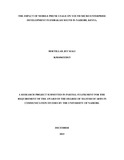| dc.description.abstract | ICT use has proven to be efficient and reliable in the economic development of any nation. High level of unemployment and improper use of ICT has increased the need to sensitize the youth on ways in which they can make proper use of ICT to develop economically. This study aimed at assessing the impact of mobile phone usage on youth micro enterprises development in Embakasi South. The study was guided by specific objectives: To find out the current pattern of mobile phone use among youth entrepreneurs; To find out the mobile applications and services that support youth entrepreneurship; To explore how mobile services and applications are being used by youth entrepreneurs to develop their businesses; To find out the effectiveness of mobile phones in growth of youth Micro enterprises. This study applied two theories; participatory model and the Technology Acceptance Model (TAM) which was extended to include other external factors to help predict user acceptance of the mobile phone technology in micro enterprises. The study adopted a descriptive survey design and targeted a population of the youth in Embakasi South Constituency. A sample of 336 youth entrepreneurs were taken as respondents using stratified random sampling. This study utilized a questionnaire with open and close ended questions, an interview guide to collect primary data from a key informant and a FGD guide to collect data from focus groups. Analysis of quantitative data involved the generation of descriptive statistics while qualitative data was analysed using thematic analysis. Bar charts, pie charts, and tables were employed to represent the data for interpretation. The findings indicate that many youths are using the mobile phone to run their businesses and benefitting from the technology that comes with the mobile phone with over 90% of the respondents owning mobile phones. Youth entrepreneurs are using mobile services and applications very often to run their businesses with 239 respondents out of 300 indicating using the phone in business. Mobile application like Facebook, WhatsApp and OLX were being used to market goods cheaply and faster. Calling and SMS services were also used to make communication easier between clients and entrepreneurs. The use of the mobile phone was found to be effective in business transactions using mobile payment methods that were found to be convenient, faster, easier to use, less costly as compared to other transaction methods. Despite the challenges that may have been encountered with the use of the mobile phone, the results here provide clear support to the idea that the mobile phone has a positive impact on youth microenterprise development with 217 out of 239 respondents indicating that the mobile phone has had a positive impact on their micro enterprises hence effective. The study concluded that the youth ae increasingly adopting the mobile phone in their businesses meaning that mobile phone technology is playing a big role in micro enterprise development. The mobile phone is an effective tool of communication in youth micro enterprise development. The study recommends further research to be carried out to find out how mobile phone impacts on micro enterprises across the country, including rural areas. Mobile service providers should ensure there are enough agents based at the community level to cater for their clients. A study should be done to show how other forms of ICT contribute to the economic development of the communities | en_US |

